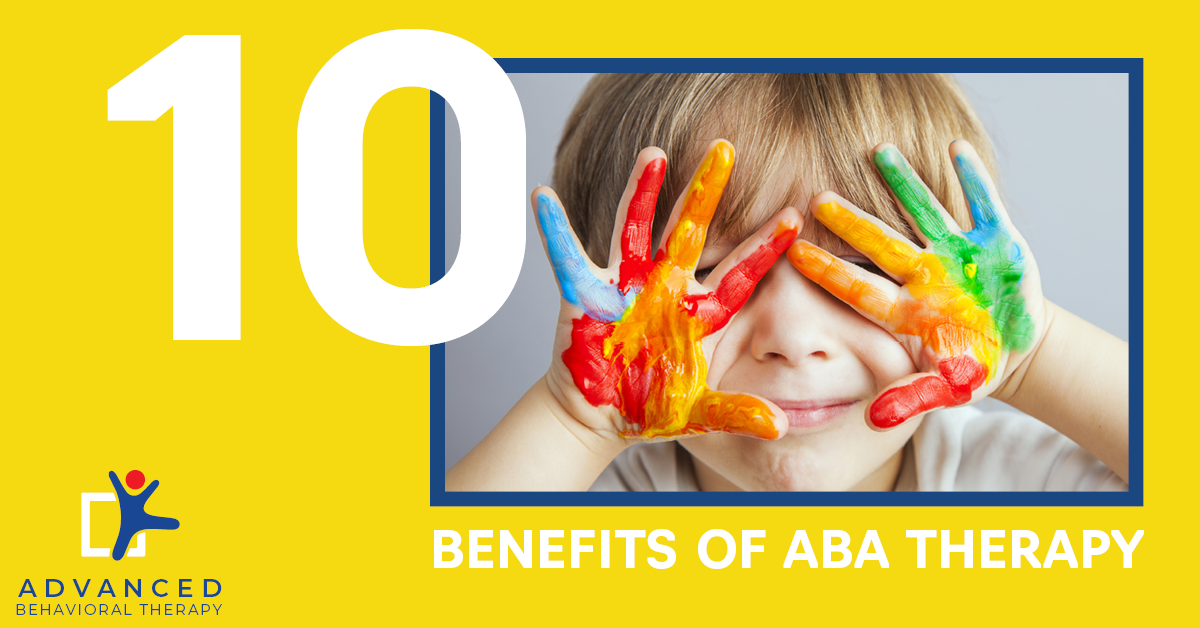
ABA therapy, or Applied Behavioral Analysis, is an evidenced-based therapy that focuses on improving
children’s specific skills. These skills can include communication, language, social, behavioral, cognitive,
self-care, and more. ABA therapy is especially beneficial for children with developmental delays,
intellectual disabilities, or Autism Spectrum Disorders.
Here are the top 10 benefits of ABA Therapy:
- It provides individualized assessment for each child.
ABA therapy is not a one-size-fits-all approach. Instead, a licensed professional will evaluate each child
individually and observe the child playing and interacting in their natural environment. When the
therapist has observed and recorded sufficient data on the child, they will work with the child’s parents
and instructors to develop a tailored approach that best suits the child. - ABA therapy is an evidence-based approach.
There are numerous studies supporting the effectiveness of ABA therapy. In fact, evidence shows that
90% of all children who receive 40 hours of ABA therapy show significant improvement in their behavior
and day-to-day functioning. - It teaches children early functioning skills.
Many children on the autism spectrum or who are otherwise struggling with functional skills, lack the
tools needed to master the most basic behaviors, like getting dressed, chatting with peers, using the
bathroom properly, holding small items with their fingers like pens and scissors, playing with others and
more. ABA therapy is focused on teaching challenged children the skills they need to function well
throughout their lives.
- It enables parents and teachers to understand the driving force behind inappropriate behaviors.
ABA does more than just teach children proper behaviors and techniques to help them master executive
functioning skills. A trained ABA therapist will also work to identify the triggers or environmental factors
that precede an improper behavior or reaction and work with the child’s parents and teachers to avoid
these triggers or modify them appropriately. - It helps children develop age-appropriate social skills.
ABA therapy focuses heavily on facilitating age-appropriate social skills in children. This includes, but is
not limited to:
• Communication skills
• Interactive play
• Initiating conversation among peers
• Taking turns using toys and while playing games
• Maintaining appropriate eye contact
• Identifying and understanding social cues - It promotes independence.
For a parent of a challenged child, it can often seem like doing everything for their child is the easiest way
out. However, every parent wants their child to grow into an adult who can function independently
without outside assistance.
ABA therapy places a heavy emphasis on promoting independence in children. Here are just a few
examples of the ways ABA therapy helps children become independent”
• Direct Instruction encourages kids to use their comprehension skills to problem-solve on their
own. Once children have mastered the skill of following instructions, they should be able to do so
without assistance.
• Pivotal Response Training encourages children child to look inward and become self-motivated
so that they want to do things on their own.
• Natural Environment Training teaches children to apply what they’ve learned in therapy to
similar situations they may encounter in their own homes. - It helps eliminate behavioral issues in children.
ABA therapy works with parents and children to eliminate any behavioral issues in children, such as
frequent tantrums, excessive irritability, screaming, disobedience and more. ABA therapy can teach your
child the proper way to express their feelings, healthy coping methods for anger, and work to understand
why a child is being uncooperative and how factors contributing to poor behavior can be remedied. - It prepares children for the real world.
Young children struggling with behavioral issues or Autism Spectrum Disorders will grow into adults
who need to function in the real world. Hopefully, they’ll hold down a real job, build lifelong
relationships, and be capable of functioning as an independent adult. ABA therapy can teach children the
skills they need to do all this and more. - It promotes children’s happiness and wellbeing.
A child who is doing poorly in school and struggling with the most basic functional skills and social cues
is not likely to be a happy child. Through ABA therapy, a child can learn to master these crucial skills,
and in turn, to strengthen their confidence, happiness, and feeling of wellbeing. - It can help children manage an early diagnosis.
In the therapy world, children who are diagnosed with a behavioral disorder in their early years can be
weighed down by a label for life—but it doesn’t have to be this way. Through ABA therapy, the child can
learn functional behaviors and skills that were previously unattainable. ABA therapy is so effective, that it
can help a child modify behaviors and manage a disorder until the disorder no longer defines them.
ABA therapy uses an evidence-based approach that has been proven to be highly successful in helping
children with behavioral issues and disorders acquire the skills they need to function well among their
peers and in their home environment. For a struggling child, it can be the key to a happier, more
productive life.









